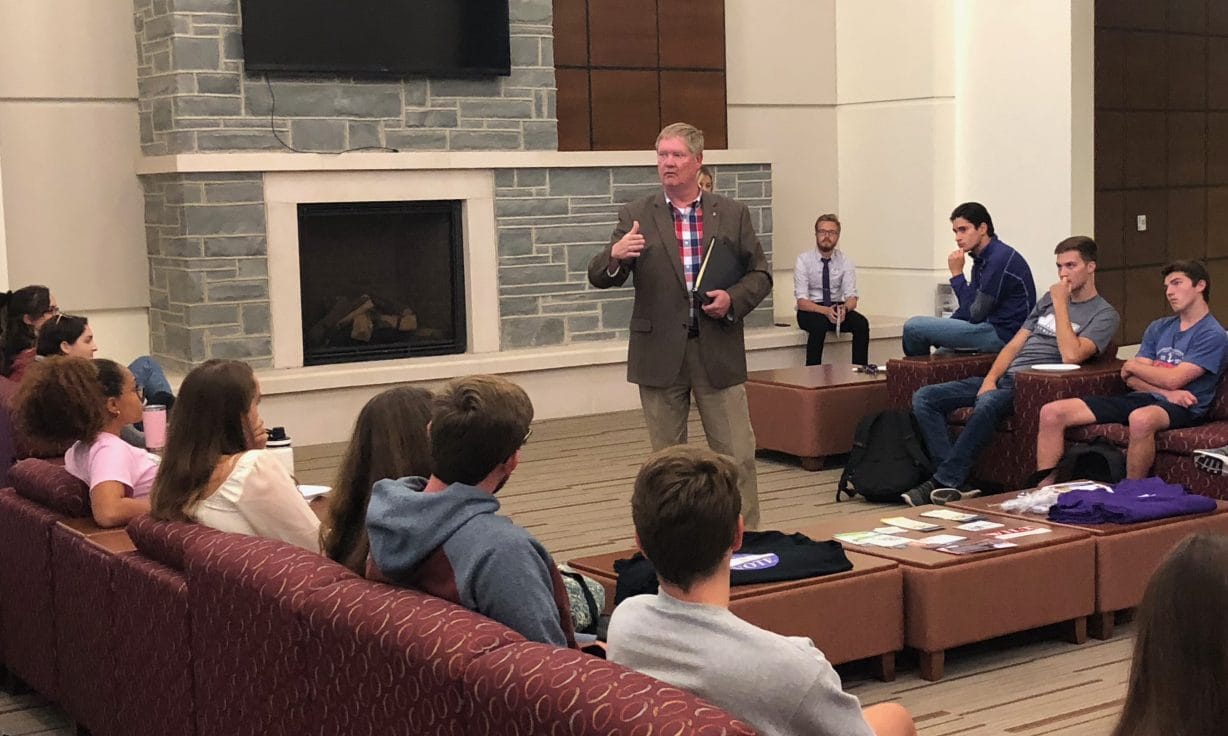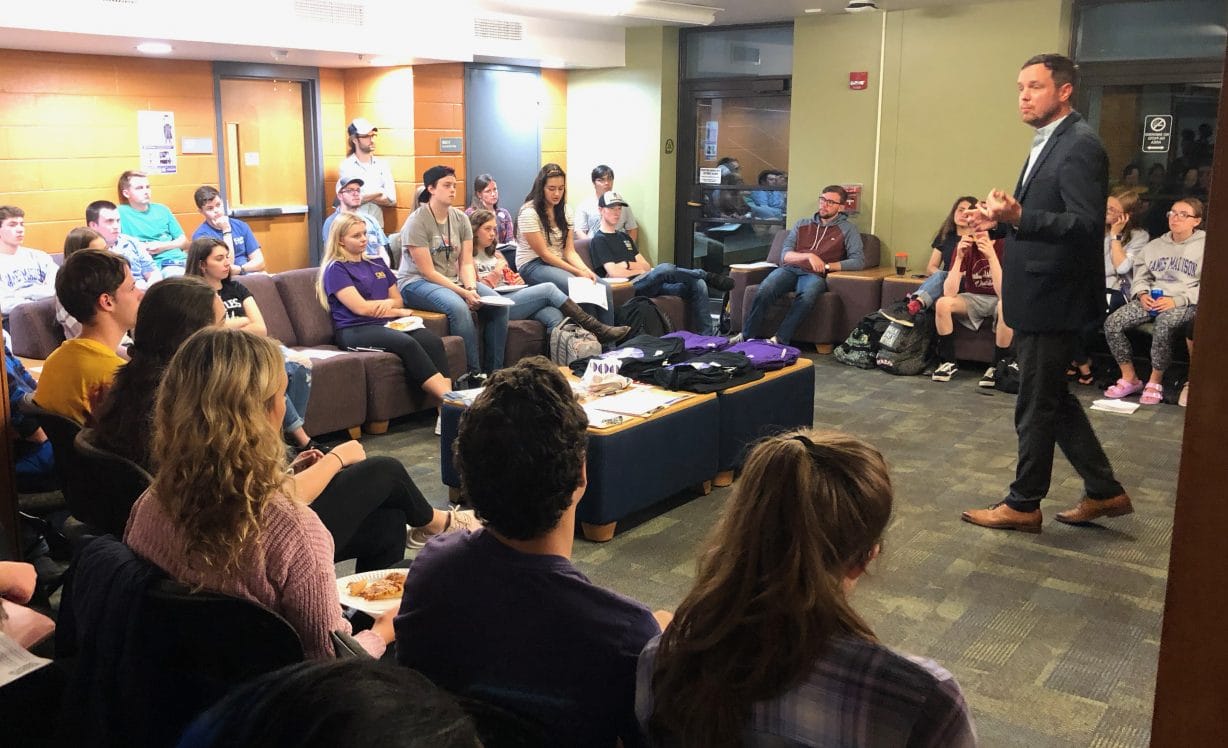
By Ryan Alessi
Speaking to JMU students Monday evening, Republican Del. Tony Wilt and Democratic challenger Brent Finnegan repeatedly — but politely — drew bright lines between their positions on promoting renewable energy, helping raise wages and accepting campaign donations from corporations.
The two candidates for the 26th state House district, which covers Harrisonburg and northern Rockingham County, made their best pitches to students in the lobbies and common rooms of three JMU residence halls as part of a Traveling Town Hall event less than a month before the Nov. 5 election. More than 50 students showed up at each of the first two stops.
Finnegan offered his case for change inspired by what he called the urgency to address climate change and economic inequality, while Wilt touted his experience in Richmond, including working to fix I-81 and holding the line against too much government spending.
Xaiver Williams, a freshman from Hampton who attended the second event at Wayland Hall, asked Wilt, who is finishing his fourth full term as the 26th District state delegate, why the General Assembly hasn’t passed any legislation in the wake of the May 31 mass shooting in Virginia Beach.
Democratic Gov. Ralph Northam called a special session in July for the General Assembly to take up a series of gun-related bills, including a ban on high-capacity magazines and a measure to allow police to take guns from someone who “exhibits dangerous behavior” or is deemed a threat. The Republican-controlled legislature quickly adjourned the session without debating any bills, opting instead to refer all proposals to the State Crime Commission and reconvene in November – after the upcoming election.
Wilt, who said some measures Northam proposed wouldn’t have prevented the Virginia Beach shooting, called the move a response to Northam’s attempt to “politicize” the issue.
“How much more study needs to happen before Republicans and Democrats come together and actually have common sense gun legislation?” Williams asked.
“I don’t think you want just a knee-jerk reaction,” Wilt responded. “The prudent thing to do is to look at it and study the effect.”
After the town hall, Williams told The Citizen he was “frustrated” by Wilt’s answer.
“We’ve been doing the same thing over and over again,” he said. “We keep talking about doing something and then don’t, and when we have the opportunity to do something about it, we still don’t do it.”
Duncan DeMarsh, first vice-chair of the JMU College Republicans, was one of a group of more than a dozen JMU Republicans who attended the first two town hall stops to pepper both candidates with questions.
DeMarsh asked Wilt at the Grace Street Apartments about his position on Virginia’s “Right to Work” law that bars unions from automatically requiring employees to pay dues. (Wilt supports keeping the law in place.)
At the next stop at Wayland Hall, in the Bluestone area of campus, DeMarsh directed a union-related question to Finnegan this time. He asked the Democrat whether he would support Finnegan campaign staffers unionizing. (Finnegan does — but when they looked into it, the campaign didn’t have enough employees.)
DeMarsh said Finnegan showed a command of the issues but isn’t a candidate he could support.
“He knows his stuff, I just disagree with him on policy — just the amount of government programs he argues for, I worry about the tax burden,” DeMarsh said.

On the environment
No topic showed more philosophical contrasts between Wilt and Finnegan than the issue of energy and the environment.
Finnegan, for instance, repeatedly said Virginia should join the Regional Greenhouse Gas Initiative, a collation of mostly northeast states — but including Maryland and Delaware — that agreed to adopt and enforce tougher caps on carbon dioxide emissions from those states. And he criticized the Republican-led legislature for failing to pass the “Solar Freedom Bill,” which advocates say would bolster investments in more solar energy.
“It’s not worth risking our clean water, clean air and putting more fossil fuels in the air,” Finnegan said. “We have got to do a better job ant the state level to transition to clean energy.”
Wilt said he supports renewable energy. But, without calling out Finnegan by name, he said those who have criticized him for his votes are pushing for too much, too fast.
“I’m excited about renewables,” he said. “What I’m voting against is just a carte-blanche, across-the-board, let’s turn the switch off here with [fossil fuels] and let’s turn this on over here with renewables. That will destroy our households.”
As a related issue, the two offered sharply different views on accepting money from corporations, as they have throughout the campaign. Wilt said he accepts corporate donations because he makes decisions on legislation independently and isn’t influenced by who gives his campaign money.
Finnegan has declined corporate donations, although he answered one student’s question about why he accepted a donation from a California nonprofit that supports addressing climate change. He told the students at Grace Street that he accepted the group’s money because it’s not a business asking for advantages from government to make a greater profit.
On wages
Wilt also emphasized his philosophy that people would be better off economically if government didn’t get in the way with regulations and mandates.
“We are raising the minimum wage as we speak. How are we doing that? We’re doing it through a healthy economy,” he said, adding that some companies are increasing workers’ pay as an incentive.
Finnegan, meanwhile, supports raising the minimum wage and is a co-founder of a campaign to encourage and recognize businesses for voluntarily paying their workers higher rates.
He pointed to Arkansas, which he facetiously referred to as the “People’s Socialist Republic of Arkansas,” where legislators there agreed last year to raise its minimum wage gradually to $11 by 2021.
On Trump and Fairfax
One student at the Grace Street Apartments, asked Wilt for his opinion of President Donald Trump’s “unorthodox approach.”
“I’ve got to be careful how I answer that one,” Wilt said. “The job that he does – and then you look at how he does it … I would say probably on a lot of those things, that wouldn’t be my approach.”
But he said his focus on Richmond — not Washington.
At Wayland Hall, one student asked Finnegan whether he’d support hearing from the two women who accused Fairfax, the Democratic lieutenant governor, of sexual assault. Fairfax has denied any wrongdoing.
“I’m one of the people who did call for him to step down,” Finnegan said. He added that he’d like to see the women be able to present their information in a way that’s “not a political circus but is respecting the victims.”
Rare joint appearance
Monday marked the third Traveling Town Hall event put on by the Madison Center for Civic Engagement at JMU. Wilt, Finnegan and Democratic primary candidate Cathy Copeland participated in one last spring, and congressional and U.S. Senate candidates — or their surrogates — spoke at the first one last fall.
It also represented one of the few times this fall that Wilt and Finnegan have appeared together, although area media organizations — including The Citizen, The Daily News Record, WHSV, WMRA, The Breeze and Breeze TV — are working on coordinating a forum for later this month featuring the two candidates.
In the meantime, many of the students recognized that they could play a pivotal role in the 26th District, whose voting population is largely split between Harrisonburg precincts that Finnegan won in 2017 and Rockingham County precincts, where Wilt was strongest. Wilt, who defeated Finnegan in 2017, won the county precincts with nearly 73 percent of the vote while Finnegan received 63.5 percent of votes cast in the city. The number of voters from the county and city two years ago was roughly the same.
DeMarsh, the JMU College Republicans vice-chair, said their group has been mobilizing to reach students who live in the 26th District (some JMU off-campus housing that’s east of the city limits isn’t in the district).
“It really depends on the campus precinct,” he said. “If a bunch of students vote, that could really flip the election. So we’ve been doing a ton of door-knocking.”
Editor’s note: As part of his job at JMU, Ryan Alessi serves as a Faculty Democracy Fellow for the Madison Center for Civic Engagement, which put on Monday’s Traveling Town Hall event.
Journalism is changing, and that’s why The Citizen is here. We’re independent. We’re local. We pay our contributors, and the money you give goes directly to the reporting. No overhead. No printing costs. Just facts, stories and context. Thanks for your support.














